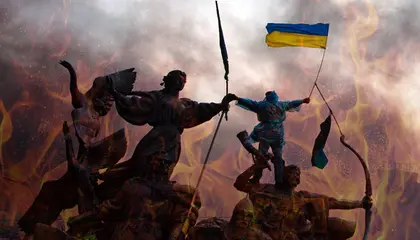Suddenly the West has been surprised by the possibility of Ukraine defeating Russia and expelling it from its territory. It has taken some time for everyone, even Moscow, to admit that the Ukrainian counteroffensive in the Kharkiv area has brought results and that it may be the biggest turning point in the 200-day war.
But where does the surprise come from when faced with the prospect that Russian aggression will come to an end with the approaching Ukrainian victory – and, as a consequence, a likely debacle in the Kremlin?
JOIN US ON TELEGRAM
Follow our coverage of the war on the @Kyivpost_official.
In an article titled “It’s Time to Prepare for a Ukrainian Victory of Ukraine,” published in The Atlantic on Sept. 11, Anne Applebaum provides a detailed analysis, followed by an assessment of the development of military and political events.
On the following day, The Washington Post published an interview with Francis Fukuyama on the same topic. He recalls how in mid-March he was convinced that Ukraine would win. Six months later, after the Ukrainian counteroffensive, he is still convinced. “The Ukrainians are going to continue to rout the Russians. It’s hard to know exactly how long it’s going to take. But I think it’s going to happen sooner rather than later,” Fukuyama said.
Indeed, Ukraine’s liberation of a huge swath of territory from Russian occupation was a surprise for many, especially for those who do not closely follow the course of war. Perhaps they were still “sleepy” from the stalled front lines of the summer, in which neither side made progress. It was a surprise to some that Russian troops retreated so quickly, taking casualties and leaving behind huge caches of weapons and equipment.

EU Transfers €1.5 Bln Raised From Russian Assets for Ukraine
It’s as if they haven’t understood, even after half a year, that this is nowhere near the “second-best army in the world,” as they called themselves. But after almost seven months of Ukraine’s just and unwavering fight against the aggressor, should anyone be surprised by the possibility of Kyiv prevailing?
Less than a month after the beginning of the aggression in an article titled “The Day after Putin,” we at the International Security Institute estimated that Putin should be excluded as a factor from any future calculations on the international political scene. We assessed that it was futile to invest any hopes and expectations in a partnership with him after the Ukrainian aggression. “It is inconceivable that the Ukrainian crisis will end, in any way, with the return of Vladimir Putin to the international arena as an acceptable partner and equal interlocutor,” we wrote in mid-March.
Yes, the world should really be ready for a Ukrainian victory and the liberation of this country from Russian aggression. If it was not ready at the very beginning, then the moment is approaching, because the offensive in the Kharkiv area clearly shows that we are at a turning point, and the outcome on the battlefield is certain.
This success of the Ukrainian army is not a final victory. There will probably be more swings of the pendulum, but the direction of the war should now be visible to everyone, and no one has the right to be surprised by Ukraine’s triumph.
This is especially true for those countries and their leaders who still consider Putin an interlocutor, at the very least, and essentially a political and trade partner, who just happens to be doing something “dirty” and difficult to accept these days. Yet they reckon that a truce in Ukraine will bring Putin back to the international arena as an interlocutor without whom no solution will be possible. They come from the most developed countries of Western Europe, from members of the EU and NATO, even from the United States, not to mention Turkey or the Balkans.
Treating Putin as an unwanted but unavoidable interlocutor/partner is what Putin expects from others, hopes for and benefits from. No one but him can profit if, even after his aggression against Ukraine, he remains a factor to be considered regarding any event on the world stage. Not even Russia will benefit – only Putin – though it seems too late for Russia to realize that.
Nevertheless, it is not too late for everyone else in Europe and the U.S., not even for those leaders who still cannot conceive of a future architecture on the border between Europe and Asia without Putin’s participation.
Ukraine’s successful counteroffensive against Russian invaders should be the final wake-up call from such delusions, as full victory may come sooner than many are ready for. If they still have any dealings with the Russian leader – and they do – they should end them as soon as possible, because after the day when the war in Ukraine ends “the day after Putin” will come.
Russia will declare victory in Ukraine on that day, there is no doubt about it. Russia will choose one of its numerous war goals announced so far and declare that they have been fulfilled, perhaps a victory parade will be held in Moscow’s Red Square and a holiday will be declared in the country.
Putin can learn a lot about this from his equally aggressive predecessor in warfare, Slobodan Milošević. The Serbian leader tried to spin the collapse of the Serbian state in Kosovo in 1999, the withdrawal of its security forces, and the entry of NATO troops into Kosovo as a victory in the three-month war and the achievement of his original goals.
Just as Milošević’s propagandistic masking of defeat did not change the reality, Putin’s future “triumph” will not hide the fact of Russia’s defeat and its ostracization from the world, isolated and condemned to failure. That is, if he even thinks that some future “Victory Day” is real.
You can also highlight the text and press Ctrl + Enter






